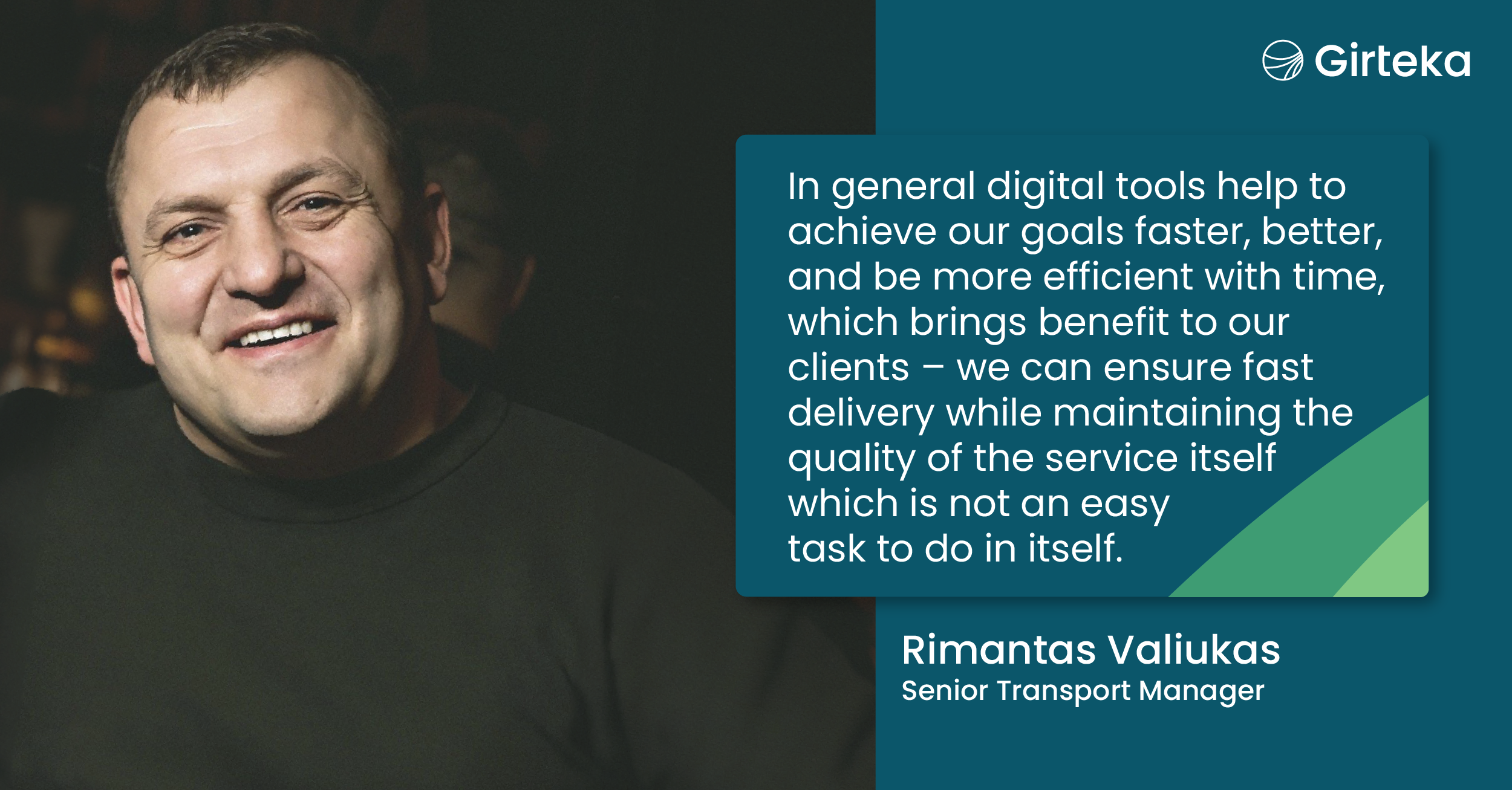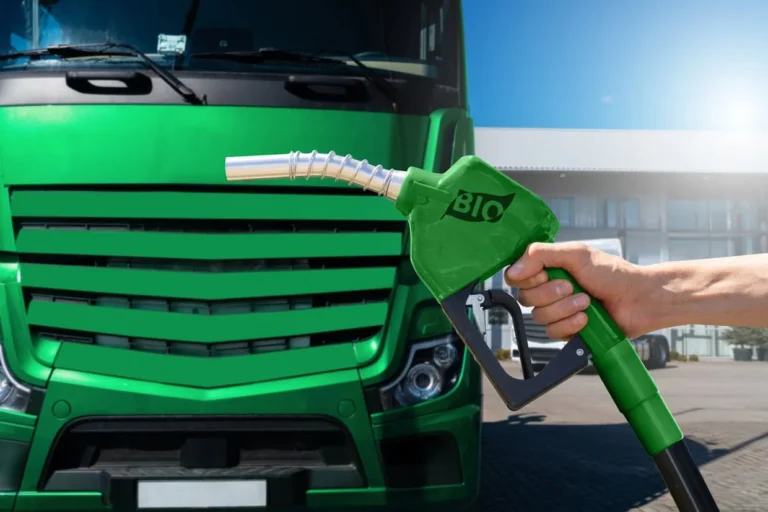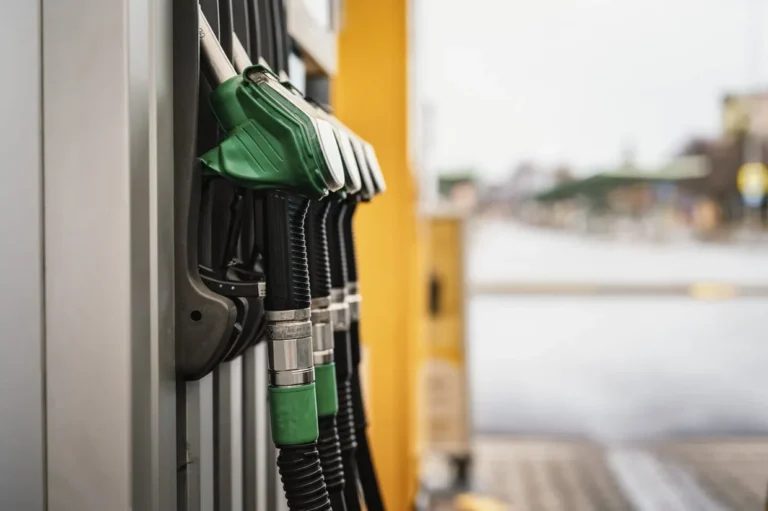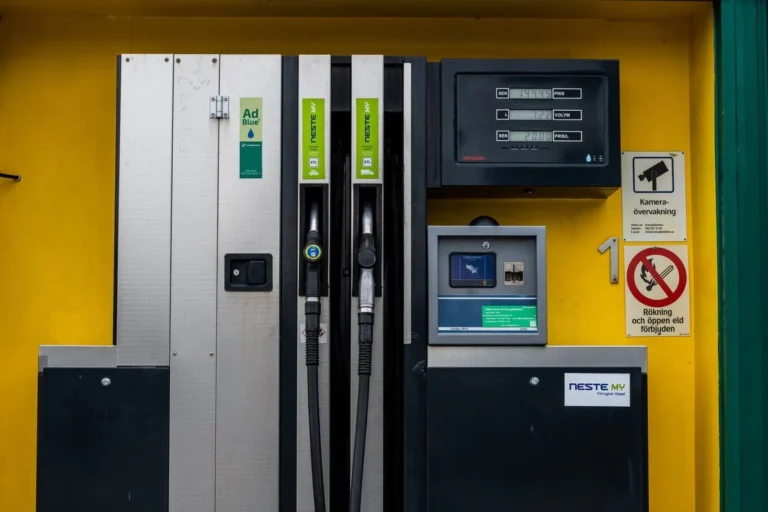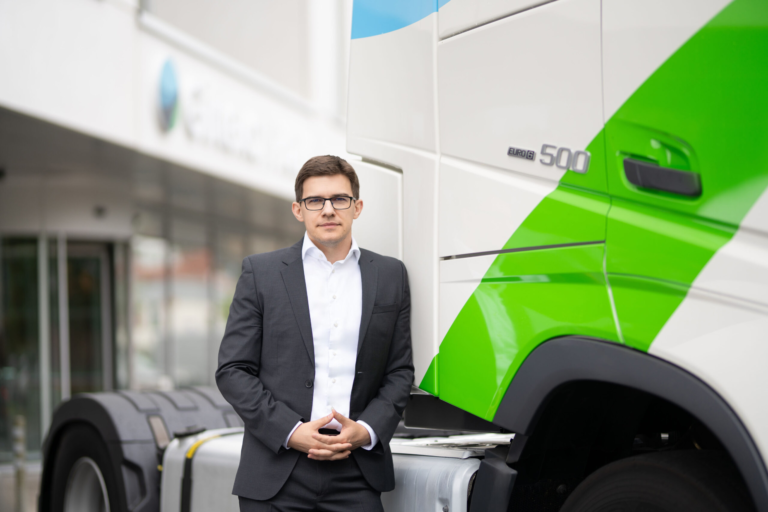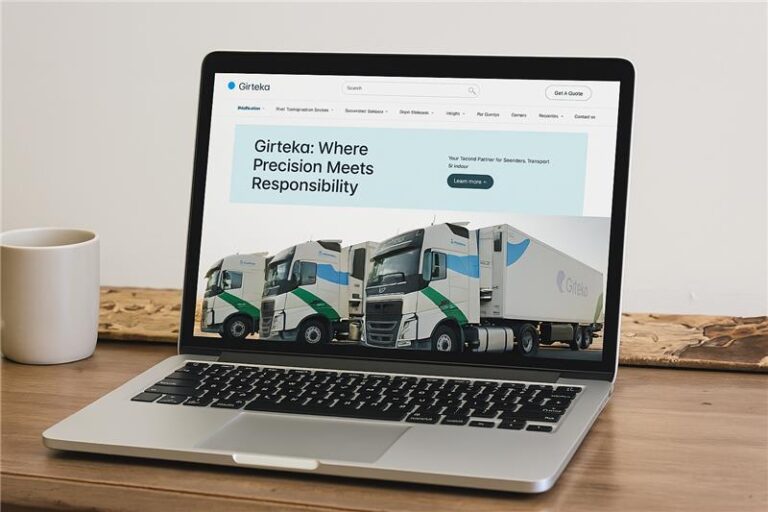Rimantas Valiukas, transport manager at “Girteka Group”, who has been working in logistics for more than 20 years now, smiles when starting to talk about his career “I have been working in logistics so long I can’t even remember the exact date when it started.” Rimantas shares that when he was considering his career path, approximately 20 years ago Lithuania’s market was still trying to recover and economically it was a challenging time. The logistics sector, meanwhile, was the most prospective and profitable area to work in which is why it quickly became competitive. However, Rimantas current position of transport manager was not an overnight result.
“I built my career gradually and entered the logistics from the very first step – I started as a driver, carrying things, then went to a bigger car, then went to semi-trailer, then to truck, until I reached the point where I am now – working as a transport manager.” Rimantas, having experience of over 20 years in logistics, has been part of Girteka since the year 2011.
As logistics tends to be a very dynamic sector, Rimantas, despite working in this sector for more than two decades, says that he was never bored at his work or considered working elsewhere or in any different area as even though working in logistics can be challenging and demanding, it also tends to be very dynamic and gives you plenty of opportunities to grow and develop not only as an employee but also as a person, trying out and adapting to new technologies, new ways of business processes throughout the years.
“There is no time to be bored, every day you make different decisions, the market itself changes very fast and you constantly grow and improve. In comparison to other sectors, I think only travel agencies provide you with the opportunity to travel within the frames of your work, apart from the logistics sector and it applies not only for drivers. I think worth to mention is also the thing that in a constantly changing environment, we also constantly implement new software, new tools, and technologies, which helps to make decisions based on data and experience. And this kind of combination gives you competitive advantage on the market.”
Love what you do and do what you love – a secret to a successful career
When asked for career advice, Rimantas without a doubt says “You got to love what you do and be ready to put all of your heart into it”. He mentions that before going for the logistics sector, especially for the transport manager specialty, you must understand that this is a job that requires you to be available for support 24/7 and you must be ready to work effectively and be determined to solve problems and achieve goals no matter what.
“In general, when aiming for one or another career, doesn’t matter if it’s logistics or not, you must set your goals and expectations clearly, know what you want to achieve with this career, and have a clear understanding of how you want your future career to look like”.
Rimantas, being a logic-driven person himself, feels cheerful about having the opportunity to not only use his professional, but also personal skills for better results in his daily work and emphasizes the importance of being a great planner and logical thinker in logistics, as well as self-confident.
“In this sector, especially in transport manager position, there are lots of daily decisions to be made, my advice would be to not be afraid of taking non-standard decisions, but again, take measured actions, plan ahead and really think ahead every time: how does this action affect my goals? And here working at Girteka there is one more thing – the data. Thanks to constantly stored data, analysis and constant information flow, we as transport managers have plenty of insights and information to make the right decisions on time and exactly what drivers, customers and we are expecting”.
The important part to also consider, according to Rimantas is the fact, that you are responsible for other people in this position. “You have to remember that this is a service-based position where you have to advise daily, solve problems, be not only oriented to the result but also try to find common ground with drivers from different countries, and different cultural backgrounds and be responsible for their performance as well.”, says Rimantas.
Digital tools – a helping hand in everyday tasks
Being a long-time employee, Rimantas can really tell a story of evolution in logistics as he faced many of these changes and was a part of them himself. He shares that the profession he had chosen back then is very different from what we see in logistics nowadays, especially taking into consideration not only the sector changes but how the world has changed in general with more and more technologies implemented in our lives and the amount of information accessible every day. One way to handle it – is the implementation of digitalization and automatization processes which are now taking over the market, logistics not being the exception. Rimantas, working as a transport manager, shares his perspective on it:
“In general digital tools help to achieve our goals faster, better, and be more efficient with time, which again brings benefit to our clients – we can ensure fast delivery while maintaining the quality of the service itself which is not an easy task to do in itself. A transport manager’s job requires lots of constant communication with drivers – digital tools play an important role here in taking care of technical tasks and leaving more time for communication with the driver which helps to build stronger trust and bonds between driver and transport manager. This synergy is crucial when speaking about efficiency as when the work is built on trust, there are fewer questions to be answered and the work itself is smoother.”
Future of logistics – electric trucks and fully digitalized processes
As Rimantas, has been working in logistics for over 20 years now, he can be called quite an expert in logistics. Rimantas, speaking from his own experience, says that the processes of automatization and digitalization are inevitable and sooner or late all the processes will be fully automatized. When asked about what future awaits logistics, Rimantas also mentions that with today’s tendencies of sustainability and modernization, it is very likely that even the trucks will be fully controlled by artificial intelligence and sustainable transport, such as electric trucks or trucks using more environment-friendly fuel alternatives are the new future.
“When speaking about the future of logistics, I think it is inevitable that most of the processes be automized and digital, AI tools will do 90% of tasks in the sector. I see that more and more services would be provided remotely, and most transportation services would have sustainable trucks that are either electric based or use alternative fuels that are more environment friendly. With support from AI and robotics solution, there is more and more time to focus on individual cases, relations and communication, which stays in boundaries of peoples relations“.
Today, logistics is all about mixing the old ways of doing things with new digital tools. This blend helps make the work more efficient. Yet, the heart of the job is still about quick thinking, solving problems, and working with people. As we move into a future where things like AI and green practices become more common in logistics, the need for these human skills won’t go away. Rimantas’ story tells us that even in a world full of digital advancements, the real driving force in logistics is still people who can handle a fast and ever-changing environment.
